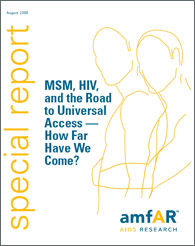MSM 19 times more likely to be infected with HIV, says AIDS group |
|
|
Men who have sex with men (MSM) are 19 times more likely to be infected with HIV than the general population, yet nearly half of the 128 country reports fail to provide any data on MSM, says AIDS group amFAR. The American Foundation for AIDS Research (amFAR) said in a report released on Aug 4 at a global AIDS conference in Mexico City that it found that an alarming 44 percent of 128 country reports submitted to the United Nations AIDS agency UNAIDS failed to provide any data on men who have sex with men (MSM).  The report titled MSM, HIV, and the Road to Universal Access - How Far Have We Come? also found criminalisation of male-male sexual activity to be a major driver of the epidemic among MSM in many countries. It noted that seven out of the 10 countries with the highest reported prevalence among MSM criminalise homosexuality. The AMFAR report identified Kenya, Jamaica, Benin, Thailand, and Ghana as the countries with the highest reported percentage of gay and bisexual men infected with HIV. amfAR press release: As AIDS Conference Opens, amfAR Releases Report Exposing Global Failure to Address HIV Among MSM At the opening ceremony of the XVII International AIDS Conference in Mexico City, UN Secretary General Ban Ki-moon, WHO Director-General Margaret Chan, UNAIDS head Peter Piot, and the presidents of Mexico, Botswana, and St. Kitts and Nevis called on governments to refocus attention on protecting men who have sex with men, who make up a large and growing portion of the epidemic in every part of the world. In the United States, a new report released Saturday by the CDC showed that HIV infections among gay men have risen 75 percent over the last 15 years. We need to engage them, we need to take care of them, we should not forget about them, said WHO Director-General Margaret Chan, referring to MSM communities worldwide. The worldwide statistics are shocking. Globally, men who have sex with men are 19 times more likely to be infected with HIV than the general population. In Latin America, which is hosting the biennial international AIDS conference for the first time, MSM are 33 times more likely to be infected than the general population. And though MSM make up nearly a quarter of those infected with HIV in Latin America as a whole, programs targeted toward MSM receive less than 1 percent of total HIV/AIDS spending in the region. amfARs report studied 128 country reports submitted to the United Nations, and found that nearly half of countries (44%) failed to provide any data whatsoever on MSM. Despite a unanimous commitment that all UN member countries made in 2001 to monitor HIV among high-risk groups, the report found that 71 percent of countries said they did not have any information on the percentage of MSM reached by HIV prevention programs. Much of this failure can be attributed to a lack of leadership from both national governments and the institutions charged with leading the global response to HIV/AIDS. World leaders are finally saying the right things, but they need to follow their words with actions, said amfAR CEO Kevin Frost. The failure of the Global Fund, PEPFAR, the World Bank, and the worlds other global health bodies to devote significant resources toward reducing HIV rates among MSM is indefensible. These organizations have policies on women, drug users, migration - but not one of them has a comprehensive policy on MSM. The report also includes an update on the state of the global epidemic among MSM, identifying Kenya, Jamaica, Benin, Thailand, and Ghana as the countries with the highest reported HIV prevalence among MSM. Although data on MSM are scarce, the report found that MSM are 18 times more likely to be infected with HIV than the general population in Asia and at least 4 times more likely in Africa. The report also found that criminalization of male-male sexual activity is a major driver of the epidemic among MSM in many countries. Seven out of the 10 countries with the highest reported prevalence among MSM criminalize homosexuality. Globally, 86 countries criminalize male-male sexual activity, and in seven countries, male-male sexual activity is punishable by death. This institutionalized stigma and discrimination frequently prevents MSM from accessing even basic HIV/AIDS services. Unfortunately, when it comes to human rights and HIV, somewhere between the declarations and the practice, many governments fall into a hole. That is especially true when sexuality is introduced into policy debates, said Joanne Csete of the Firelight Foundation, who also contributed to the report. Governments should be concerned about the corrosive effects on broader society, both epidemiologically and otherwise, that arise when they repress people on the basis of sexuality. In 2006, all UN member states committed to report on a total of 23 indicators relating to various aspects of the HIV epidemic. Five of these 23 indicators are relevant to MSM and measure prevalence of HIV infection, rates of HIV testing, HIV knowledge, condom use, and access to prevention programming. The fact that 77 countries did not report any data on HIV prevalence among MSM signals a callous indifference and a lack of responsiveness to the epidemic among this vulnerable population. The full report MSM, HIV, and the Road to Universal Access - How Far Have We Come? can be downloaded at media.amfar.org. |
Sign In

读者回应
MAY THOSE COUNTRIES, GOVERNMENTS AND LEADERS BE CURSED FOR ETERNITY AND BURN IN HELL FOR CONDEMNING SO MANY PEOPLE TO INFECTION..
Cheers!
Please login to post a comment